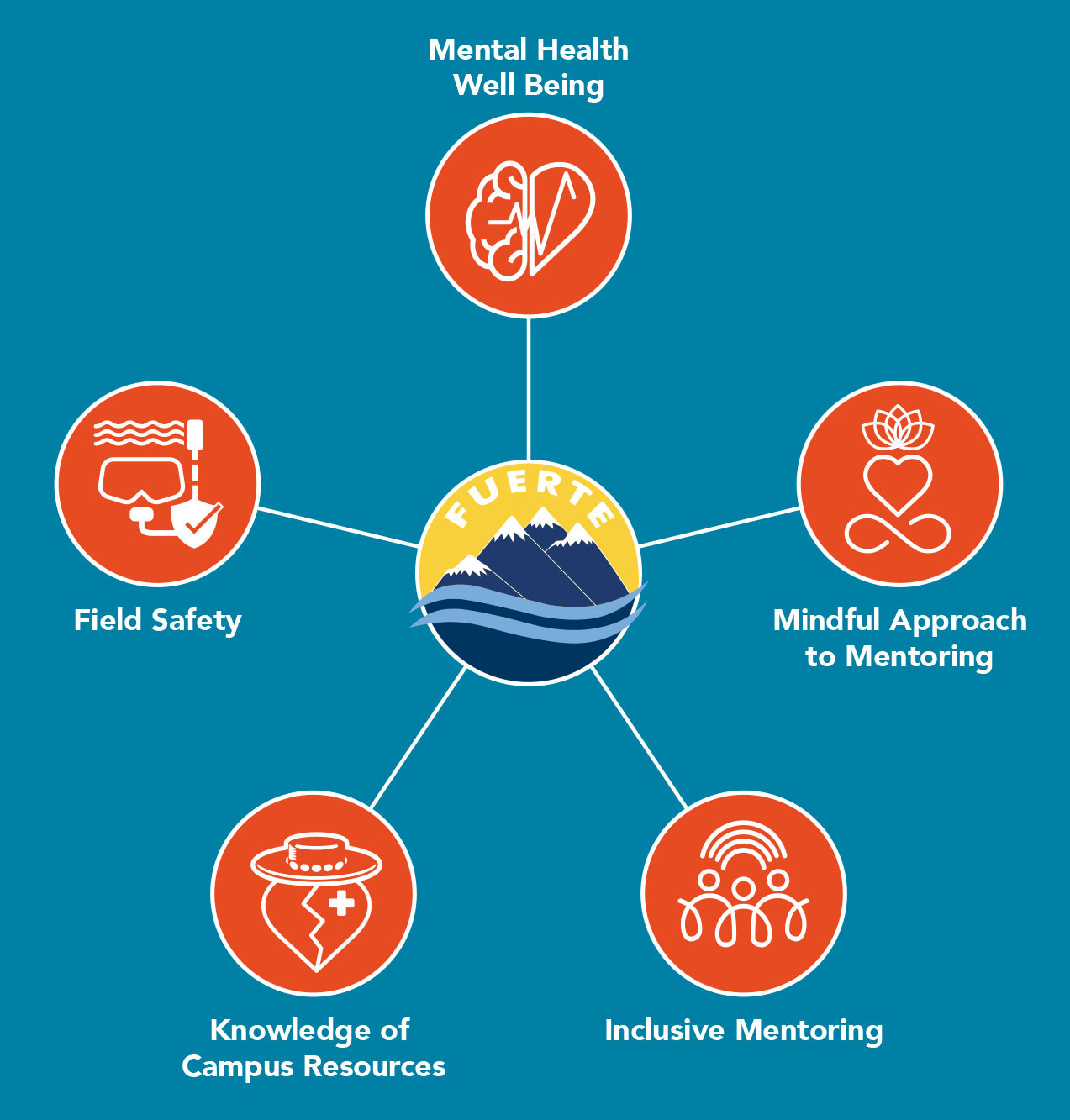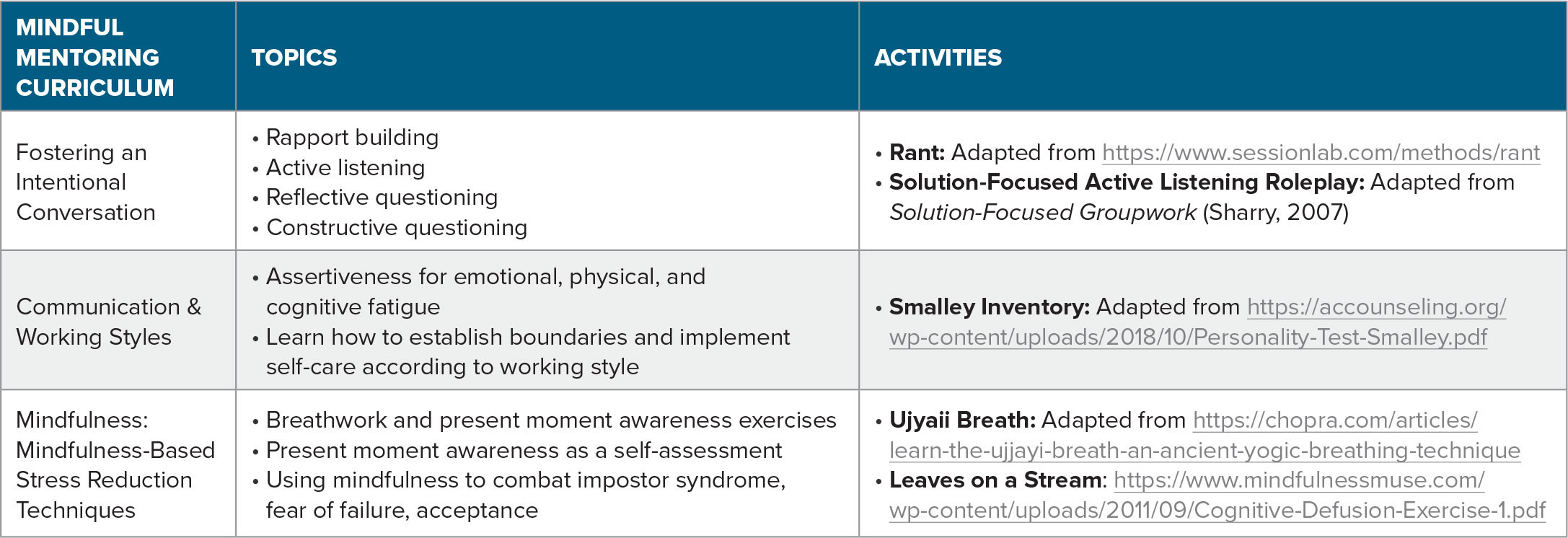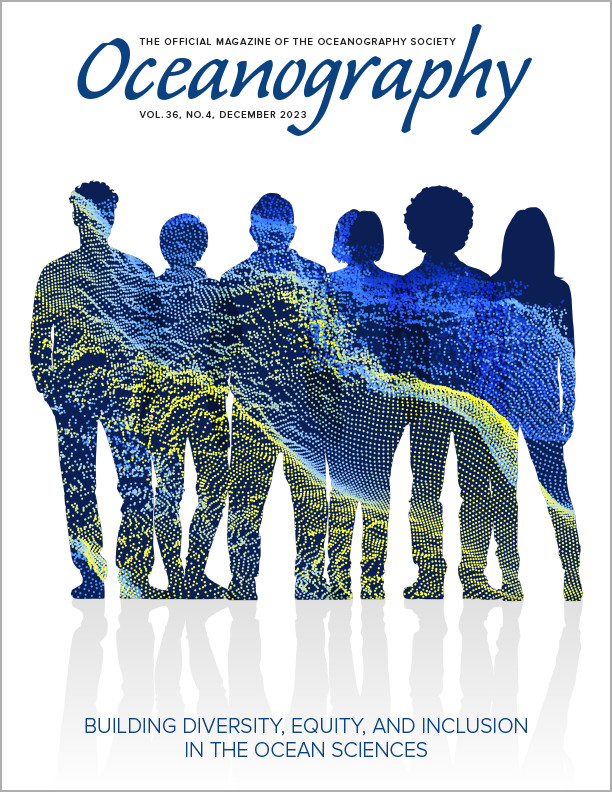INTRODUCTION
Undergraduate research experiences (UREs) are considered significant to the success of undergraduates in STEM (NASEM, 2017), and the mentoring relationships developed during UREs comprise an important part of URE success. Good mentoring increases retention and the sense of belonging (Davis and Jones, 2020), specifically for undergraduates who are from underrepresented groups (Estrada et al., 2018; Hernandez et al., 2018; McGill et al., 2021; Shuler et al., 2021; Markle et al., 2022). In practice, graduate students frequently mentor undergraduates during UREs, and often the graduate student mentor has a low or variable degree of experience and training in mentorship. In addition, there is often limited programmatic support for graduate students to gain skills, despite the fact that these early career scientists are highly influential in the success of underrepresented scholars in STEM.
To bridge this training gap, we developed a workshop series to support skill development for graduate students who would be the direct research mentors for undergraduates in a US National Science Foundation funded program at the University of California, Santa Barbara, called FUERTE (Field-based Undergraduate Engagement through Research, Teaching, and Education; https://fuerte.eemb.ucsb.edu/). Funded in 2019, though program initiation was delayed by the pandemic, FUERTE focuses on building equity and inclusion in marine science and environmental science by bringing a sense of belonging to our undergraduate mentees. We are now in our second year of recruiting FUERTE Fellows, and though we are very much in early days of the program, we can share some lessons learned and reflections on what we might do in the future.
FUERTE is designed to introduce undergraduates to research in both terrestrial and aquatic environments, especially research that includes an element of fieldwork. FUERTE Fellows are appointed for three years; they start as rising sophomores and then engage in three sequential summer rotations: (1) a two-week group field trip to a research station in the Sierra Nevada mountains during the first summer, (2) an eight-week research experience during the second summer, and finally, (3) career internships as rising seniors with a non-academic unit, for example, at NOAA or The Nature Conservancy, during which they can integrate their experiences in research with their career interests. It is during the second summer in the FUERTE series that our graduate student mentors work with the student Fellows.
In developing the Mentoring the Mentors series, we hope not only to enhance our mentors’ skills but also foster a sense of community, support, and self-care for the mentors. We are very much riding the tail of the pandemic, and the impact on undergraduates is only now being revealed (Nocco et al., 2021). In conducting this workshop series, we acknowledge that our graduate students might themselves be experiencing stress due to the demands of graduate school combined with the aftermath of the pandemic (Gushulak et al., 2023). We hope that by building a sense of community, we can help our graduate students feel more connected and that our support of their development as mentors increases their own senses of belonging (Holloway-Friesen, 2021). This is important to us, as the cultural identities of graduate students continue to expand. Our FUERTE mentors come from groups that are underrepresented in ecology, evolution, and geosciences, and it is paramount that as colleagues we honor their experiences (Cech and Waidzunas, 2021; Berhe et al., 2022; Nguyen et al., 2022; Gushulak et al., 2023) as we navigate the shared practice of supporting our undergraduate FUERTE Fellows.
Each workshop series topic was allotted 1–1.5 hours per session and was led by an expert in that particular area. In order to allow the 10 participants time to process the information, five sessions were spread across three to four weeks and began just prior to the beginning of the summer research period. The training series covered five specific topics: (1) mental health and well-being, (2) a mindfulness approach to mentoring, (3) tools for inclusive mentoring, (4) outdoor safety with an emphasis on diversity, and (5) resources specific to our campus, for example, counseling services available to undergraduates (Figure 1). We attempted to foster a sense of community during these gatherings, and we also strove to present topics in a scholarly light by providing readings for each topic (Table 1).

FIGURE 1. The five core areas shown here are featured in the Mentoring the Mentors workshop series that is part of the Field-based Undergraduate Engagement through Research, Teaching, and Education (FUERTE) program at the University of California, Santa Barbara. > High res figure
|
TABLE 1. Readings shared with participants in the FUERTE mentor workshop. > High res table

|
Cultivating a Mentorship Style
As a first step in the workshop series, we introduced our intent to increase all mentoring skills and to grow together as a team. The first session was designed to introduce mentors to the intentional mentoring style we use in the FUERTE program (sensu Schuler et al., 2021) and to discuss the challenges that our underrepresented mentees may face. We also included material on the topic of growth and fixed mindsets (O’Keefe et al., 2018). This introduction to the workshop series set the tone for how FUERTE aims to support mentees. Part of the purpose of these workshops is to set aside time for participants to develop their own mentoring styles and for us to advocate for intentionality in the mentoring process. This session is then followed by a more interactive session that addresses a mindful approach to mentoring by both building skills in mentoring and simultaneously thinking about self-awareness and self-care.
A Mindful Approach to Mentoring
The mindful approach to mentoring emphasizes mental health and well-being. Led by author Beaufort, we emphasized that mindfulness in a mentoring practice is an essential tool and is one of the more effective psychological interventions available (Hanson and Mendius, 2009). We then present a set of exercises that introduce core elements of mindfulness in mentoring, for example, intentional conversations and active listening. Key areas covered were:
1. Intentional Conversation and Active Listening
Intentional conversations are discussions that focus on fostering personal and professional growth while also including mindfulness and being present in the moment. These conversations involve four key elements: rapport building (empathy), active listening, open-ended questions, and constructive questions. Mentors were taught these elements through role-play exercises that focused on active listening (Table 2).

TABLE 2. Table of activities shared with the mentors in the Mindful Mentoring session. > High res table
|
2. Emotional Intelligence
Mentors were given guidance on understanding their personal needs based on their animal personality type via the Smalley Inventory (Table 2), which can be used to improve emotional intelligence in relationships. By identifying their major and minor animal personality types and the corresponding strengths and weaknesses, mentors learned how to work more productively with their mentees. Mentors and mentees can use this knowledge to communicate their needs effectively and set achievable goals, particularly during fieldwork training, as they assess their stress levels and take steps to avoid burnout. Rather than reacting impulsively to stress, they are taught to evaluate their personality types and act accordingly. Mentors were also trained to support their mentees throughout the summer research experience while also maintaining personal boundaries.
3. Mindfulness-Based Stress Reduction
This part of the series offers techniques to help mentors and their mentees achieve balance and focus on mindfulness, including using the ocean or ujyaii breath (Table 2), a guided imagery exercise called Leaves on a Stream (Table 2), and prompts to self-assess physical, cognitive, and emotional fatigue.
Overall, we emphasized a mindfulness approach to mentoring and presented this as a means to improve emotional intelligence and well-being for both mentors and mentees, enabling them to better adjust to situations that might be encountered while doing research projects.
Inclusive Mentoring, Intersectionality, and Identity
The FUERTE program uses intentional practices when mentoring. Part of this process is understanding the challenges that marginalized or underrepresented individuals face and how best to create an environment where everyone feels welcome. One major aspect of building a sense of belonging in mentees is acknowledging intersectionality, a concept that has a significant history across disciplines, including higher education. We relied on scholars in the field to guide our learning about how to use the lens of intersectionality to better understand how people with multiple marginalized identities may be especially challenged in STEM (Núñez et al., 2020). We were also motivated to engage in this topic in the belief that better understanding the life experiences and identities of our undergraduates would enhance our collective mentoring skills.
Led by author Clare, we hosted a panel that featured early career scientists with intersectional identities. During the relaxed and informal panel discussions, graduate student mentors were guided in ways to discuss their own intersectional experiences. This allowed mentors to think more deeply about the ways in which they might cultivate inclusive environments for our students, by first looking at the intersectional identities within our own community. Sharing experiences in public settings can be emotionally challenging, so we recruited senior graduate student mentors who came from backgrounds underrepresented in STEM and who had experience speaking on their intersectional identities in public settings in a safe and informative way.
The guiding themes of the panel discussion were: (1) What is intersectionality? (2) What are the identities we bring into our roles as mentors? (3) How can we build an understanding of challenges academia historically poses for those with intersectional experiences? We explored these themes via a short presentation where panelists shared their intersectional identities, including for example, as an immigrant, queer, Black, Latina, first generation, or gender fluid, or as a person of working-class upbringing or with financial hardship. After introducing their intersectional identities and how those identities shape the way one navigates STEM as a scholar and mentor, the moderator then led an open discussion that encouraged mentors to reflect on their own intersectional identities and recent discoveries of self.
This panel showcased the importance of peer-led discussions in navigating politically and emotionally sensitive topics in our training. Having expert peer panelists who represented a wide range of disciplines within and outside STEM (e.g., marine biology, environmental science and management, linguistics and higher education, and student affairs) was a strength of this portion of our training, as mentors were able to grasp the fact that underrepresented scholars at all stages and across all disciplines struggle with advocating for their intersectional identities in academia. Because our mentors may not always share the same backgrounds with our students, through our discussion, we learned that mentors can feel insecure in their ability to support oncoming generations of diverse scholars. We also found that by having learned more about the challenges of being an intersectional scholar from their own peers of underrepresented backgrounds, our mentors were inspired to expand their perspectives on how to support underrepresented mentees by accessing emotional empathy and openness when working with our undergraduates.
Familiarity with Campus Resources
Having ready access to help on campus for issues that come up for our mentors was an important part of the Mentoring the Mentors series. For this session, we invited a lead staff member from our student services group to help us understand the layers that might be encountered in finding assistance for mentees. Resources are numerous and widespread at our large R1 institution, so it was important to bring awareness to the breadth of resources available to our undergraduates and pinpoint some that may be most critical or relevant to those with intersectional identities. This session created time to discuss mental health and how to assist mentees should such issues arise. We also addressed conduct expected both on campus and while away on university business or research because many graduate students are new to campus and university life, the terminology and policy surrounding conduct are unfamiliar, and they may not be aware of the anti-harassment policies on campus (e.g., Title IX and other anti-harassment policies) and their role in reporting infractions. Here, we approach this as core to inclusive mentoring practice and direct them to other resources on campus. This session also allowed the opportunity to discuss the FUERTE code of conduct that undergraduate participants agree to and to emphasize the fact that the University of California, Santa Barbara, Code of Conduct is an umbrella policy that we all work under whether we are on campus or off campus at a remote field site or on a cruise.
Safety While Working in the Great Outdoors
Working in the outdoors is a significant element of the research experience for the FUERTE Fellows. UCSB offers a diverse portfolio of research activity that ranges from hiking to remote study sites in the Sierra Nevada to research diving in the local kelp forests. Our goal with this session was to highlight best practices for all outdoor trips as well as campus resources that support specific types of activities. Our efforts here are greatly supported by the university’s Environmental Health & Safety (EH&S) office, where there are coordinators for field safety and for boating and diving, and a number of detailed resources online. The presentation was made in person by EH&S staff with special attention paid to the template for making a Field Safety Plan (https://www.ehs.ucsb.edu/programs-services/field-research-safety/field-safety-plan).
Other topics covered include challenges and dangers faced by underrepresented scholars in the field and how leadership and communication are critical in a fieldwork setting. As part of the larger discussion about fieldwork, we emphasized how building awareness of a student’s identity and life experiences can allow us as mentors to build in more education and training before diving into the research experience. For example, not all mentees have had the chance to go camping or hiking with their families. Our goal is to elevate the awareness of the direct mentors so that they are mindful of their mentees’ experience levels, the need for awareness of their safety in the field, and how to ensure their mentees’ comfort in the field.
Conclusion: The View Ahead and Lessons Learned
Although we do not have formal research results regarding the workshops, we surveyed the participants and received anonymous quotes about the series. When asked to reflect on the utility of the overall experience, responses included: “The mentoring workshop was a wonderful way to have open discussions about the values and strategies of mentoring undergraduate students,” “the workshops were useful and made me feel better prepared to be a mentor,” and one noted that the experience “provided us with beneficial strategies for engaging and working with students from a diversity of backgrounds and experience levels.” In terms of the sessions and things that were learned or were the most useful, participants responded with: “I was particularly interested in the lessons presented on engaging a diverse undergraduate population and how to respectfully understand some of the challenges that underserved or minority students can face,” and “I am glad I now know the mental health resources available to students on campus, and the discussion of gender diversity in our field was really useful.” The spirit of the comments from the participants underscored how much they learned from each other, and going forward we plan to incorporate time when the mentors can meet and exchange ideas and insight.
The one issue we could not have seen coming in 2019 was the impact of the pandemic on the mental health and the well-being of our undergraduates. Going forward, we will continue developing resources to support undergraduates as they navigate university life after years of relative isolation. Lastly, as the leaders of the FUERTE program, we are motivated to model compassionate mentoring and to recenter self-care and prioritize well-being for the entire team.
ACKNOWLEDGMENTS
The authors are grateful to Miguel Guillen, the Academic Coordinator for FUERTE for 2021–2022, who contributed to organizing and developing the workshop series. We thank Monica Pessino of Ocean o’ Graphics in the Marine Science Institute at UC Santa Barbara for designing the graphic in Figure 1. During this project, XSC was supported by a National Science Foundation Graduate Research Fellowship (Grant number 1650114). This activity was supported by NSF grant number 1953492 to GEH and MP.
AUTHOR CONTRIBUTIONS
As PI of the NSF award to support the FUERTE program and as FUERTE’s Director, GEH is the lead author on the paper and initially conceived the idea of the project and manuscript. GEH and MP conceived the original idea of the mentoring series when the proposal was written, and VB and XSC were presenters in the mentoring series and wrote the manuscript for their sections, mindful mentoring and intersectionality, respectively. The four of us worked together as a collaborative team to write the manuscript and develop the narrative. All authors have approved of the final version of the manuscript.




